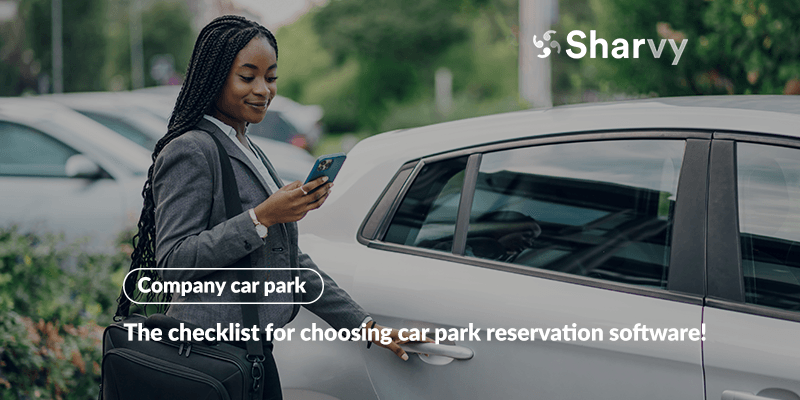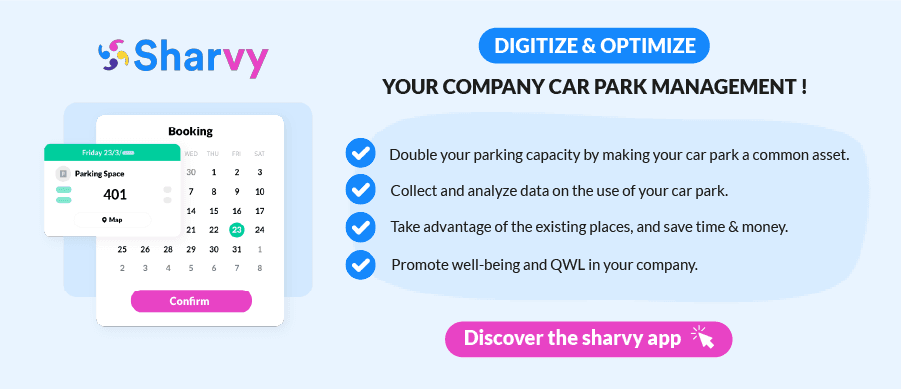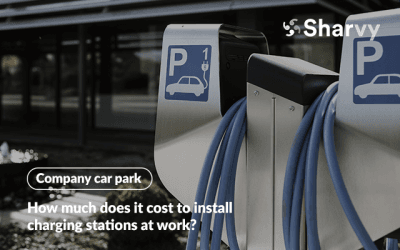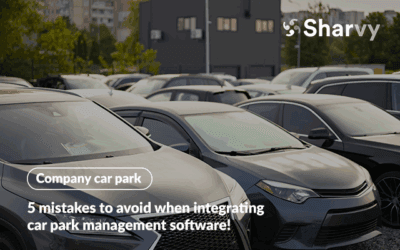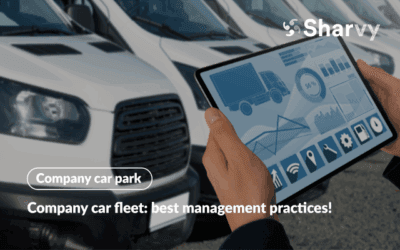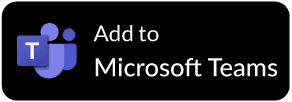In many companies, car park management remains an invisible issue… until it becomes a source of tension. Between allocated spaces that are never used, employees endlessly circling to park and visitors left unannounced, manual management quickly reaches its limits.
That’s where parking reservation software comes in: a tool designed to make things run more smoothly, simplify day-to-day operations & transform parking into a value-added service for your employees.
But beware: not all solutions are created equal. Between the attractive features on paper and your company’s real needs, it’s easy to make mistakes.
So how can you avoid these mistakes & choose software that ticks all the boxes? Here’s how.
Understand your needs before comparing parking reservation solutions.
Before you start choosing car park reservation software, it’s essential to clearly define your company’s needs. Every organisation has its own particularities: is your car park reserved exclusively for your employees, or does it also receive visitors? Do you share your car park with other companies?
It’s also important to ask questions about usage: should spaces be allocated individually or remain flexible depending on arrivals? What is the daily volume of reservations, and what peak periods should be anticipated?
Beyond day-to-day management, what are your main objectives? Is it to make parking more fluid, optimise the use of spaces, improve the experience of employees, or to have reliable data with which to adjust your organisation?
Finally, don’t forget to involve your stakeholders: HR managers, technical teams and employees can all provide valuable information to help you distinguish between essential and optional features. This preparatory stage is crucial if you are to compare solutions effectively and choose software that is truly appropriate, without getting lost in superfluous options.
The essential criteria to check when choosing your company’s car park reservation software: the checklist!
1. Is the tool really easy to use?
Good car park reservation software should be part of your staff’s daily routine. A few clicks are all it takes to reserve, modify & cancel a space, without getting lost in complicated menus. All from a computer or smartphone.
For you, as managers, it must offer a clear & instant view of availability, as well as reservations, without each adjustment becoming an administrative chore.
Can you easily identify free places and duplicates? Modifying parameters, freeing up spaces and generating reports must all be quick and intuitive, without complex operations.
In short: simplicity is not a detail, it’s what ensures that everyone saves time, from day one.
2. What features are essential?
The first question to ask is: can your staff who have seats easily free them up when they’re away? Without this functionality, spaces remain unused when they could be used by others.
And what about visitors? Can they reserve a temporary space without disrupting the daily routine of the holders? An efficient system must make this operation quick and easy for everyone.
To optimise space, ask yourself: can we create groups of spaces and define specific priorities? For example, could you reserve certain spaces for PRMs, pregnant women, car-pooling and other occasional needs?
Finally, is your car park managed fairly? Are there credits or quotas to limit the frequency of reservations and encourage fair use? An intelligent algorithm can allocate spaces fairly, taking into account one-off absences, recurring needs & overall availability.
This is exactly the kind of functionality Sharvy offers, transforming the company car park into a flexible & fair daily service for all your employees & HR teams.
3. Can the software integrate with your existing systems?
Company car parks don’t work in isolation. It is often linked to automatic barriers, access terminals, badge systems, and even internal tools such as CRM & human resources management software (HRMS).
If the software you choose can’t communicate with these systems, you risk multiplying manual tasks and losing the efficiency you were trying to gain.
That’s exactly where Sharvy makes the difference. Thanks to API integration with your HRIS (Lucca, Kelio, Horoquartz and many others), the application enables HR departments and employees to avoid double entry and the risk of errors.
In practical terms, when an employee who holds a seat is absent for the day (teleworking, business travel, illness, etc.), Sharvy automatically communicates with the HRIS to free up the seat and make it available to other employees, but only for the duration of the absence.
The benefits are numerous: HR managers benefit from seamless synchronisation of schedules, optimising the use of places and meeting the needs of a greater number of employees. At the same time, access rights to parking areas are automatically aligned with information in the HRIS, reinforcing security and guaranteeing transparent management of rights. The result: fewer conflicts, greater efficiency & a simplified parking experience for all.
4. Is it flexible & customisable?
Effective parking reservation software needs to be adaptable to the specific needs of your business.
Can you define different rules for different types of employee & groups of spaces? For example, can you reserve certain spaces for PRMs, pregnant women, car-pooling or frequent visitors?
Customisation doesn’t stop there: being able to adjust rates, reservations (half-days), credits & messages sent to users is essential if the tool is to remain relevant over time.
Flexibility also means that the software can evolve with your company: adding new buildings, increasing the number of employees & changes in the organisation of parking spaces. A rigid tool risks becoming obsolete as soon as your car park or internal rules change, whereas a customisable solution adapts & simplifies day-to-day management.
5. Is security guaranteed?
Security is a major issue, both for employees and for the company. Good software must protect personal and financial data, comply with regulations (such as the RGPD) and guarantee reliable hosting.
But security isn’t just about digital information: it’s also about physical access rights to car parks. A well-designed system ensures that only authorised people can use reserved spaces, and that permissions are automatically updated if there are changes in the organisation.
In other words, security must be both digital and physical, to avoid abuse, conflicts and errors in the allocation of spaces.
6. What about support?
Even the most intuitive software can run into problems and raise questions, which is why responsive & competent support is essential.
Is it easy to contact a helpdesk? Are there guides, tutorials & training for your teams?
Regular updates are also crucial: they ensure not only that new features are added, but also that any bugs are quickly corrected.
As a result, a good support service allows administrators to manage the car park with peace of mind & employees to book their spaces without frustration, even when the unexpected happens.
7. Finally, is the price transparent?
Cost is often a decisive criterion, but you shouldn’t limit yourself to the basic rate. It’s important to check all the elements of the business model: monthly and annual subscriptions, installation costs, maintenance costs and any additional services.
Software may seem attractive at first, but hidden charges & unspecified limitations can quickly add to the bill. Transparent pricing not only allows you to plan your budget accurately, but also to assess value for money and choose a solution that is truly adapted to your needs and your organisation.
Mistakes to avoid when choosing your car park reservation solution.
Choosing car park reservation software may seem simple at first glance, but certain common mistakes can turn your investment into a source of frustration. Are you sure you’re not falling into these traps?
The first mistake is to focus solely on price. Cheap software may look attractive, but it risks missing essential functionality, generating manual manipulation & imposing hidden costs. Sometimes, a slightly higher investment guarantees a complete, secure tool that is truly adapted to your needs.
Next, don’t overlook compatibility with your existing systems. Software that doesn’t integrate with your automatic barriers, badges or HRIS will waste precious time and increase the number of administrative tasks. Before making your choice, ask yourself: does this solution communicate easily with my current tools?
Another common mistake is to underestimate the user experience. If your staff find the software complex & unintuitive, they may not use it properly, which reduces the efficiency of the car park and can lead to conflicts. It is essential to test the interface and check that day-to-day operations (booking, releasing, modifying) are quick and simple.
Finally, some companies choose a solution without involving the stakeholders. HR managers, technical teams and employees themselves can identify precise needs and essential functions. If you don’t consult them, you run the risk of choosing a tool that is ill-suited to the realities on the ground.
Once you’ve eliminated these mistakes, you’ll be well on your way to choosing an effective and sustainable solution.
In conclusion
Have you ever thought about what a car park (really) means to your business? It’s not just a place to park cars: it’s a place where punctuality, employee comfort and, indirectly, the productivity of your teams are at stake.
By following this checklist and asking the right questions at each stage, you can ensure that you select a solution that is effective, fair and tailored to the real needs of your employees and your company.
With the right tools, like Sharvy, you can turn this often neglected area into a strategic and operational asset for the whole company.
Got a question? Check out the following FAQ!
Can car park reservation software be used for multiple sites or buildings?
Yes, modern solutions like Sharvy are designed to manage multiple car parks & buildings from a single centralised platform. This means you can configure each site with its own rules: number of spaces available, types of spaces (holders, visitors, priority), specific times & credits.
This centralisation means that your teams can manage all your sites without having to use multiple tools, such as Excel spreadsheets. Employees, meanwhile, can reserve seats at any site, according to their needs, from the same user account, which simplifies their day-to-day work and avoids confusion.
Can booking software encourage environmentally friendly practices?
Yes, and some solutions go even further than simply managing seats. Intelligent software can encourage employees to adopt sustainable practices: for example, by reserving priority spaces for electric and hybrid vehicles, by encouraging car-pooling through dedicated credits, or by limiting the repeated reservation of a space by the same user to encourage sharing.
By tracking this data, the company can also measure the ecological impact of its employees & adjust its internal policies, thereby helping to reduce the overall carbon footprint.
Can this type of software manage different types of access rights according to profiles?
Parking reservation software such as Sharvy can be used to define personalised access rights according to each user’s profile. Permanent employees can have permanent access to certain spaces, visitors temporary access, and certain groups (such as PRMs, pregnant women & car-poolers) can benefit from specific priorities.
This granularity ensures that each space is used correctly, reduces conflicts and reinforces security. Administrators can adjust these rights in real time, for example in the event of temporary absences or modifications, so that management remains fluid and, above all, error-free.
Want to find out more? Check out our latest articles to stay up to date!
How much does it cost to install charging stations at work?
What is the real cost of installing charging stations in a business? How can you optimise your investment? Here are the answers!
5 mistakes to avoid when integrating car park management software!
What are the 5 most common mistakes to avoid before and during the integration of parking management software? Focus!
Company car fleet: best management practices!
Should you electrify, pool or automate your company car fleet? What are the best management practices? Let’s take a closer look!
Subscribe to our newsletter!
PARKING & WORKPLACE MANAGEMENT SOLUTION
Car park management - Charging points monitoring - Desk booking - Booking by time slots
SUBSCRIBE TO THE NEWSLETTER
Receive the latest Parking & Workplace trends by email once a month.

